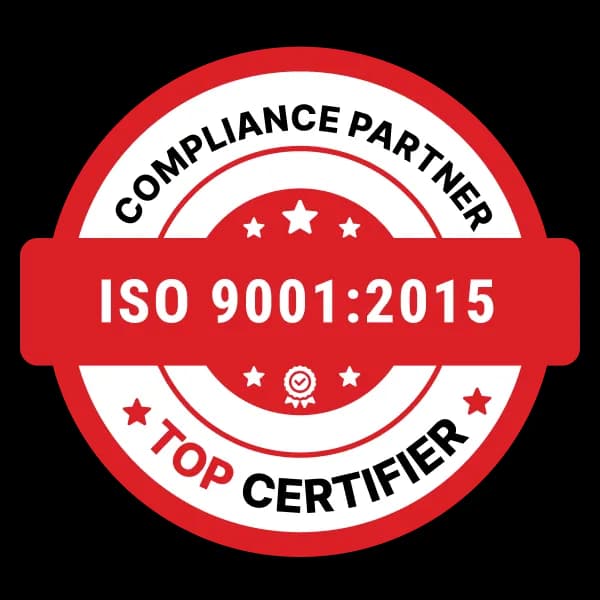Picking the Best Tech Stack for Mobile App Development
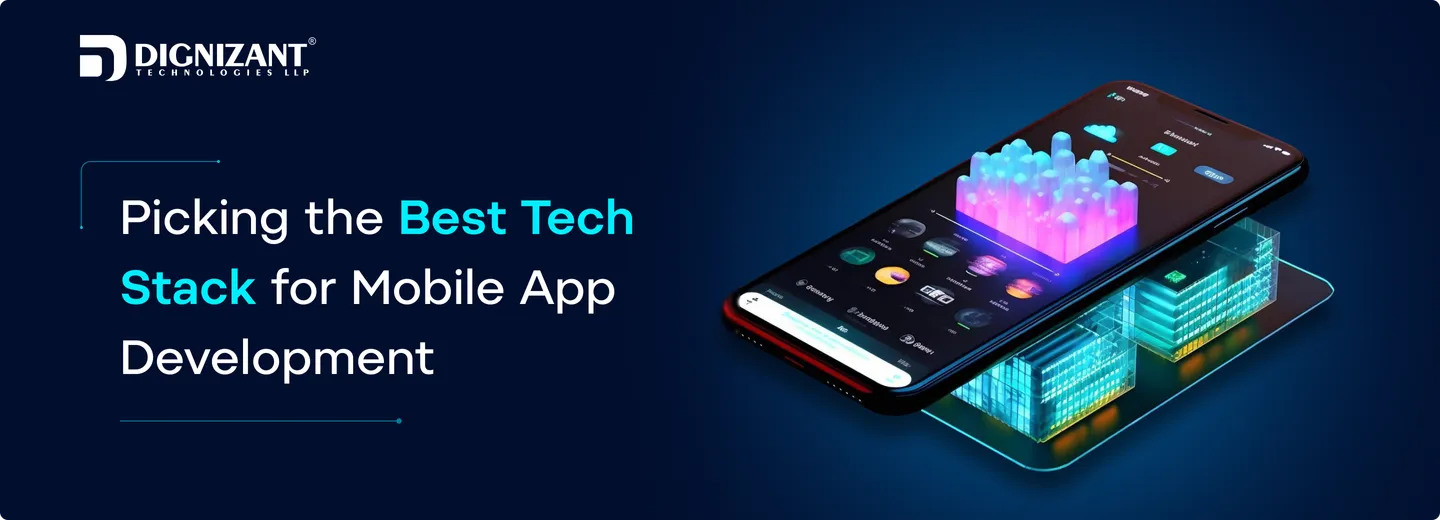
Contributor
Palash Pandya
Uploaded
18 November, 2025
Read Time
5 Minutes
Selecting the best tech stack for mobile app development types is one of the most important business decisions that companies take at an early stage when defining a product. The potential for performance, scale, time to market and security of a mobile app and perhaps most importantly its future maintainability are all determined by technology choices early in the game. As a result of the fast-paced mobile ecosystem and increased user expectations, companies can no longer choose tools using legacy frameworks or based on surface-level rationale. Instead, businesses should take a structured, proactive approach that integrates technology investing with business value, user experience demands and future potential to grow.
In this extensive guide, we will be showing you the best tech stack for mobile app 2025, considerations that have more weight and most popular frameworks that are powering the industry at present.
Understanding What a Mobile App Tech Stack Means
Tech stack is a mixture of programming languages, frameworks, libraries, utilities and technologies used by developers to create the mobile application. It generally is divided in two layers:
- Frontend (Client-side):
All user facing elements such as: UI, Animations, Gestures, Screens and User Flows. - Backend (Server-side):
APIs, data manipulations, authentication, business logic, the cloud vendor services, storage and third-party integrations.
The proper combination is chosen for two layers to get better performance and user satisfaction.
Why the Tech Stack Matters More Than Ever
Smartphones are now more than just a means of communication. They’re high-performance personal hubs for work, entertainment, finance, health and daily tasks. Users expect:
- Speed
- Offline support
- Real-time synchronization
- Smooth animations
- Multi-device compatibility
- Strong security
- Zero crashes
A user who opens an app and doesn't immediately see these features could lose that person in seconds. Whether or not your app can deliver at that scale depends largely on your best tech stack.
Types of Tech Stacks for Mobile App Development
Before choosing particular tools, you should know the three top-level mobile app development approaches.
Native App Tech Stack
Native tech stack is developed for either Android or iOS and has the best performance, and has open access to hardware devices as well as system’s functionality. Android is built on Java or Kotlin via Android Studio, while iOS is developed in Swift or Objective-C with Xcode. This is good for apps with heavy functionality, graphics or security.
Cross-Platform App Tech Stack
Cross platform stacks give developers the ability to write one code base for both Android and iOS resulting in a reduced cost of development and overall build time. There are popular alternatives like Flutter, with Dart for native performance, and React Native powered by JavaScript. These stacks are a good fit for companies wanting quick release cycles without sacrificing optimal user experiences.
Hybrid App Tech Stack
Hybrid stacks, being a mix between browser technologies and native wrappers, are able to run in different OS using the same code base. Other frameworks such as Ionic, Cordova and Capacitor that leverage HTML, CSS and JavaScript to make experiences that truly are mobile-friendly. It’s great for content-rich apps, MVPs and work that doesn’t require too much functionality.
Key Factors to Consider When Picking the Best Tech Stack
The best tech stack for mobile app development isn’t the trendiest. It’s the one that meets your business aims and future plans. These are the key variables that drive this decision:
Project Complexity and Requirements
The developed tech stack must correlate enclosure with the functional depth of the app and technical requirements. Apps with enhanced native stacks, for example fintech apps, navigation systems or even Augmented Reality features. Lightweight, content-based and MVP-style products can consider features cross-platform or hybrid.
Budget Constraints
Your budget on investment will determine whether you should go cross-platform or native. Cross platform frameworks such as flutter or react native, reduce development and maintenance cost with similar experience to the user.
Timeline for Development
Faster go-to-market strategies require technologies that enable fast development. Cross-platform tools or hybrid stacks allow it to launch faster, while native applications often require longer due to platform-specific work.
Target Platforms (Android, iOS, or Both)
If you want to target both Android and iOS, then cross platform frameworks can be better. Native stacks are required when every platform requires highly specific features or integration at the hardware level.
Performance Requirements
For apps with real-time communication, heavy animations, large operations on data or gaming components you need a highly optimized native stack well. The lighter apps can be run perfectly on the hybrid or cross platform without any performance problem.
Scalability and Future Growth
Your tech stack requires being able to handle new features, more users and updates for the long term. Stacks supported by active communities, frequent updates and good architecture planning will make you scalable.
Best Tech Stacks in 2025
The mobile app development landscape is changing. The following are the most stable and forward-looking stacks available as of today.
Flutter (Google’s Dart Ecosystem)
- Near-native performance with a single codebase for Android, iOS, Web and Desktop.
- Utilizes a widget-based system that allows visuals to be kept consistent and provides smooth interfaces.
- Great for growing startups looking to scale quickly and future-proof their success.
React Native (JavaScript Ecosystem)
- Offers versatile and powerful development with a huge ecosystem of tools, libraries and community support.
- Allows for code sharing, quicker updates and functioning with your current JavaScript stack.
- Its new architecture and modular components increase performance.
Native iOS (Swift & SwiftUI)
- Brings superior productivity, security and system-level integration functionality to iOS-devices.
- SwiftUI speeds up the development process by providing a neat and clean declarative approach.
- Ideal application: Fintech, AR/VR and high security that require precision and control.
Native Android (Kotlin & Jetpack)
- I would go with Kotlin because of more modern syntax, safety features and first class support from Google.
- Jetpack libraries simplify UI development, navigation, background tasks, and data architecture.
- For massive Android apps with complicated architecture and performance demands.
Backend Stacks for Mobile Apps (Node.js, NestJS, Django, Spring Boot)
- Node.js is powered by NestJS for modular structure and real-time functionality.
- Django is known for its fast development and includes robust security and a clean design.
- Spring boot is good for large enterprise applications that need stability and micro-services.
Conclusion
The best tech stack for mobile app development is not about selecting the most popular framework, it’s about choosing the one that suits your business requirement, scalability, budget, user expectations (UX), long-term maintenance strategy.
The right tech stack will enable your mobile app to deliver smooth performance, shorter development cycles, secure environment and the future-ready architecture. With mobile platforms developing at an extraordinary pace, companies that make smart technology choices today can achieve a significant edge in the years to come.
Latest Articles
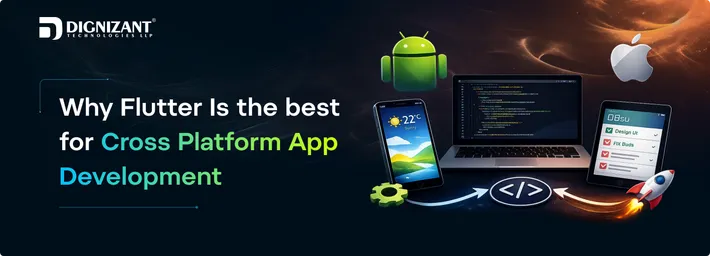
Explore how Flutter powers scalable, high performance cross platform apps with expressive UI, reduced costs, and faster time to market.
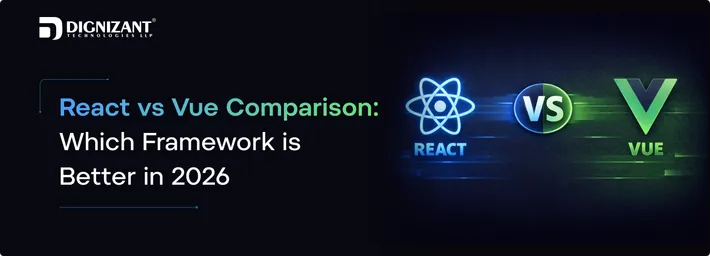
React vs Vue Comparison guide covering React JS vs Vue JS features, performance, learning curve, and use cases to choose the right framework in 2026.
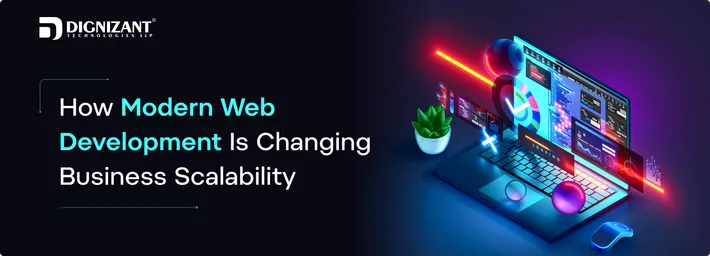
Understand how modern web development drives scalable growth by improving speed, flexibility, security, and long-term digital performance.
FAQs
Ready to Take Your Business to the Next Level?
Unlock new opportunities with expert solutions designed to elevate your brand. From strategy to execution, we empower your business with the tools, technology and talent it needs to thrive in today’s digital world.
